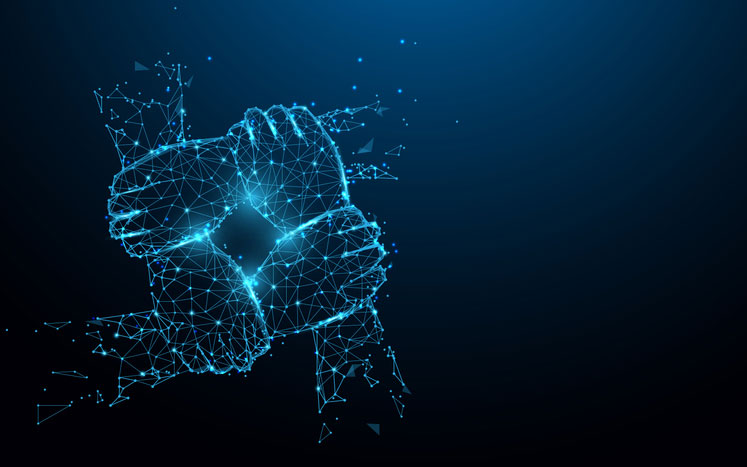 Reading Time: 7 minutes
Reading Time: 7 minutesTechnology has always been a driving force for economic development. When the first affordable cars rolled off Detroit assembly lines in the 1920s and 30s, they spawned a rich industry built around gas stations and private lending firms. Likewise, Hollywood production companies and retailers turned the television boom of the 1950s into a golden era of marketing and consumer culture.
While these advancements forever changed how people interacted with the world and the economy, they seem quaint when compared to the 21st century’s most buzz-worthy and misunderstood technology: artificial intelligence.
With AI, everything from making a bank deposit to watching a sitcom can now be a completely personal, data-driven experience. But according to Professor Jake Trippel, Chair of Concordia University, St. Paul’s MBA Program, AI isn’t just making waves in the consumer world. It’s completely changing how businesses operate and organize.
“We’re in an era where we get to rewrite everything,” he said in an interview with BusinessStudent.com. “We’re going to be rethinking management, science, organizational design, and organizational theory.”
But what will this disruption of business-as-usual look like? How are companies already preparing for it? And is there a place for humans in an automated economy that runs on ones and zeroes?
As a seasoned business school educator, researcher, and corporate tech strategy consultant, Professor Trippel has some in-depth, sometimes alarming, but ultimately hopeful answers to these questions.
 BusinessStudent.com had the privilege of sitting down with Jake Trippel, Assistant Professor and Chair of Concordia University, St. Paul’s MBA. At the intersection of education and enterprise, Professor Trippel teaches classes on organizational leadership, strategy, and HR management while he works as an Executive Consultant for tech companies across the globe. His academic research focuses on artificial intelligence and its impact on businesses.
BusinessStudent.com had the privilege of sitting down with Jake Trippel, Assistant Professor and Chair of Concordia University, St. Paul’s MBA. At the intersection of education and enterprise, Professor Trippel teaches classes on organizational leadership, strategy, and HR management while he works as an Executive Consultant for tech companies across the globe. His academic research focuses on artificial intelligence and its impact on businesses.
Automation: The New Rule of the AI Economy
The Rise of the Informed Generalist
A More Horizontal Corporate Hierarchy
The Human Element In the AI Revolution
Automation: The New Rule of the AI Economy
When artificial intelligence hit the public consciousness in the late 20th century, it was often portrayed as a cold, cyberpunk boogeyman. In popular media, AI was represented as the vicious Skynet of the Terminator series or the fugitive replicants of Blade Runner. But as we understand now, AI is poised to disrupt our world in a more mundane yet equally scary way — it’s fully capable of replacing human labor.
Think about all of the routine tasks that make up a business’s day-to-day affairs:
- Answering customer questions
- Making market projections
- Collecting and interpreting data
- Managing payroll and revenue
- Monitoring cyber and physical security
Millions of people put food on the table by carrying out these duties. But with some training, artificial intelligence systems can complete these tasks in seconds. And they can do it for 24 hours a day while keeping mistakes to a minimum.
For example, chatbots powered by natural language processing software can schedule medical appointments and process refunds, all with an unwavering, pre-programmed politeness. Machine learning algorithms can formulate profit projections quicker than any experienced market researcher. And when presented on a handy dashboard, this information comes without any fluff or unintentional bias.
How Businesses Are Embracing AI and Automation (And What That Means for the Workforce)
With these advantages in mind, the corporate world seems more than ready to automate everything they can.
According to a 2022 IBM survey of over 7,000 businesses, 35% of companies have already integrated AI into their processes. Another 42% are exploring it. And perhaps most strikingly, 65% of businesses that have already adopted AI are actively using it to automate repetitive tasks.

“Millions of jobs will be lost. That is inevitable,” Professor Trippel told us. But don’t start chucking supercomputers into the ocean quite yet. Professor Trippel sees opportunity after a period of disruption. “I’m arguing tens of millions of jobs will replace them,” he said.
A 2022 report from the World Economic Forum demonstrates just how well-placed his optimism is. By their predictions, 4.5 million jobs may be lost to automation through 2030. However, up to 6 million jobs could be gained due to the new opportunities created by an AI-driven workforce. Given how quickly technological innovations accelerate, tens of millions of new jobs could be only a couple of decades away.
But if AI adoption comes with the hope of more jobs for humans, what will those jobs actually look like?
“I believe we’re entering an era where we’re going to generate more wealth than any other time in history.”
— Professor Jake Trippel
The Rise of the Informed Generalist
Job specialization helped create civilization as we know it. Corporate hierarchies have followed the same pattern by dividing tasks by department. Just as farmers farm and painters paint, the marketing department markets and the payroll department manages payroll.
Artificial intelligence, however, could very well turn that idea upside down.
“When I was coming up in my career, we were told to become a master of something,” Professor Trippel told us. “That’s completely flipped.” In fact, he described the business professional of the future as, “a highly dynamic individual who is almost a generalist, who can go broad in their skill set or go deep if necessary.”
Logically, though, a more technologically advanced economy would seem to favor those with highly-specialized AI skills (AI engineers, computer science professionals, etc.). But as AI has become more and more integrated in business practices across the board, Professor Trippel has witnessed a new demand for people who can take on different kinds of tasks collaboratively.

“When I talk to leaders, they say, ‘Please give us anyone who can move something forward,’” he says. “‘Please send us people who can work cross-organizationally, cross-functionally, and can build relationships with other people.”
With this insight, it becomes apparent that the soundtrack to the AI revolution isn’t whirring fans and clacking keyboards. It’s the murmur of dialogue, discussion, and the open exchange of ideas.
Data And Experiences: The Driving Forces Behind AI Innovation
Whether it’s a fintech investment app, an automated profit projections program, or the latest streaming platform, AI technology isn’t just a tool. It’s an entirely interconnected experience.
“Think about everything-connected products. People have connected garage door openers, connected light switches, and cars,” Professor Trippel says. “I could go on and on about how this is impacting organizations, both operationally and in terms of becoming smarter and more data-driven.”
One way AI is impacting businesses globally is that it’s forcing them to focus on datamining, the process of collecting information about consumer and employee behaviors and attitudes. Typically, this is done on an impressively large scale meaning companies use automated machine learning software to both collect and identify profitable patterns. The big thinkers then use this information to develop new products and services or improve existing ones.
In 2021, economic research firm Statista estimates that datamining brought in about $64 billion in revenue globally. By 2027, they estimate that number will grow to $103 billion. With such a large boon at stake, it’s safe to say that datamining and data analytics departments could become as vital to corporations as marketing and finance.
As Professor Trippel says, “Wiser people than me have stated that data is the new oil, and they weren’t kidding.”
A More Horizontal Corporate Hierarchy
To foster the collaborative environment needed to succeed in the AI age, individual workers aren’t the only ones who may have to change their approach. Business leaders may have to completely restructure the conventional corporate hierarchy.
“Our traditional organizational structures are going to change,” Professor Trippel says. “How we distribute power within an organization with intelligence systems is going to change.”

If repetitive, low-level tasks become fully automated, delegating, approving, and sluggishly sending information up the command chain might become obsolete. Instead, workers can focus on high-level tasks like internal promotion strategies and goal setting. Other than a few executives at the very top, these teams would be working side-by-side instead of under one another.
“I am absolutely just fascinated by what those impacts are going to be and what successful organization is going to rise out of that,” he says. “Because there’s going to be turbulence. It’s going to be chaotic. It’s going to be exciting.”
The Human Element In the AI Revolution
Despite all of the talk about automating, datamining, and streamlining, Professor Trippel made one thing clear when he spoke with us: the AI revolution is set to be surprisingly human.
“Technology has commoditized all knowledge, but it can’t commoditize wisdom.”
— Professor Jake Trippel
As businesses explore new uses for AI, whether it’s developing automated programs to help workers do their jobs or creating smart home appliances for the consumer market, human ingenuity will have to be the guide. After all, automated programs may be able to harvest and use vast amounts of data, but it takes a creative, motivated thinker to ensure those uses are meaningful and relevant to the human experience.
But according to Professor Trippel, all of the ways that can be done have yet to be discovered. “50-60% of the jobs that we’re going to see in 2030 haven’t even been invented yet.”
Tomorrow’s business leaders and AI architects are entering a mysterious, ever-changing world, a world with few boundaries and even fewer rules. In Concordia University St. Paul’s MBA program, Professor Trippel and his colleagues aim to prepare students for that future with classes focused on corporate tech strategy, operations, and, perhaps more importantly, ethics.
“My challenge is how to prepare students for that, how to get really comfortable with ambiguity and uncertainty. Businesses need those lifelong learners, those leaders who can constantly change,” he told us. “Things are only going to get faster. That’s going to be our challenge and that’s what I hope students are really excited about.”








